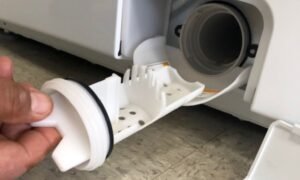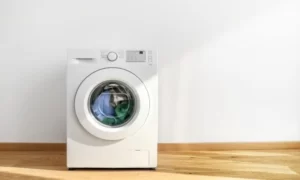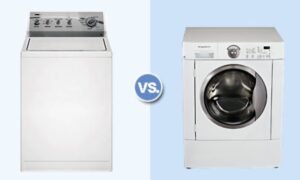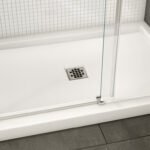Last updated on June 27th, 2023 at 05:05 am
Every home needs a washing machine since they make doing laundry more convenient. However, a washing machine’s correct operation is dependent on both the machine itself and its parts, such as the washing machine hose. This thorough article seeks to clarify the significance of choosing the appropriate washing machine hose and offers insightful advice to help you make an educated choice.
Understanding Washing Machine Hoses
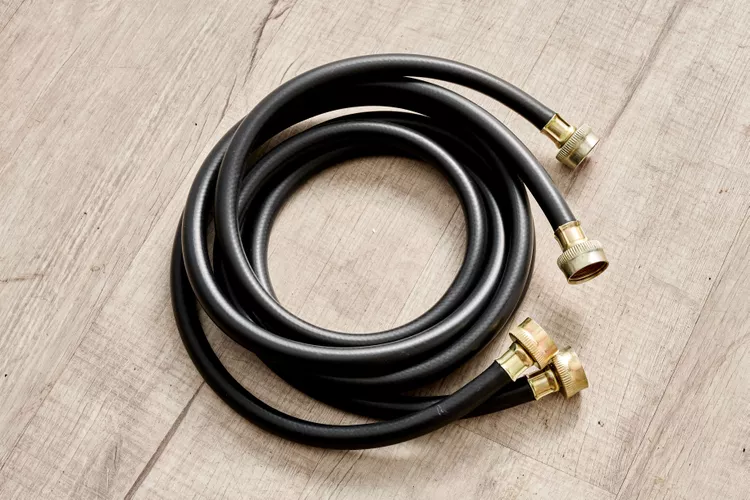
Photo Credit: thespruce
What Is a Washing Machine Hose?
A washing machine hose is a crucial part that links your washer to the water supply and makes it easier for water to enter and exit the machine. There are two different kinds of it: the intake hose, which takes water into the machine, and the drain hose, which removes spent water.
The Importance of a Quality Washing Machine Hose
Your washing machine’s hose’s quality is essential for avoiding leaks and potential water damage. A sturdy hose guarantees a solid connection between your washing machine and the water supply, reducing the possibility of leaks that might result in expensive repairs and property damage. For your washing machine to operate safely and effectively over the long haul, you must invest in a high-quality hose.
Types of Washing Machine Hoses

Photo Credit: plumbingsuppliesdirect
Rubber Hoses
Because they are flexible and inexpensive, rubber hoses are a common option for washing machines. They can sustain high water pressure and are wear-resistant. Rubber hoses must, however, be regularly inspected and replaced since they can age and degrade over time.
Stainless Steel Braided Hoses
Due to their remarkable strength and longevity, stainless steel braided hoses are regarded as a premium alternative. The outside layer is made of stainless steel, which offers defense against dents, rodents, and other possible harm. For individuals looking for a durable and dependable solution, these hoses are a recommended option because they are less likely to leak.
High-Efficiency Hoses
High-efficiency hoses are created expressly to save water while still performing at their best. Each cycle’s water usage is decreased by these hoses’ specific design and flow-limiting devices. High-efficiency hoses are a great option if you place a high focus on water saving.
Factors to Consider When Choosing a Washing Machine Hose
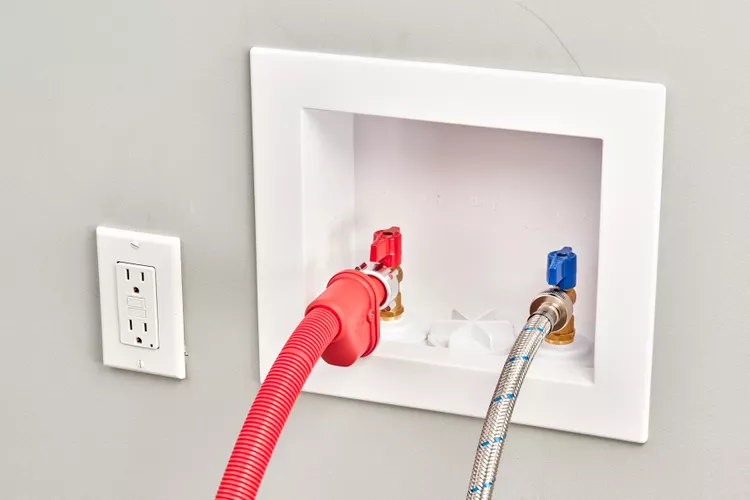
Photo Credit: thespruce
Hose Length and Compatibility
Make sure the hose is the proper length for your washing machine configuration. Select a hose that comfortably reaches without too much stress after measuring the distance between the water source and the machine. Additionally, make sure the hose is compatible with the model of your particular washing machine.
Material Quality and Durability
To guarantee hose endurance and lifespan, evaluate the hose’s material quality. Look for hoses that can resist frequent usage and water pressure, such as those constructed of high-quality rubber or stainless steel braiding. Purchasing a sturdy hose increases the lifetime of your washing machine and decreases the possibility of leakage.
Burst Strength and Pressure Rating
To be sure the hose can withstand the water pressure in your home, check the hose’s burst strength and pressure rating. A hose that has a higher burst strength can sustain abrupt pressure increases and is, therefore, more durable. To make sure the hose can manage the water flow needed by your washing machine, also take into account the pressure rating.
Hose Fittings and Connectors
Pay close attention to the hose’s fittings and connections. Choose hoses with tight connections and safe, leak-free connectors. Fittings that screw on, compress, or push together are common varieties. The danger of leaks is reduced and a stable connection is ensured by selecting the proper fittings.
Installation and Maintenance Tips for Washing Machine Hoses

Photo Credit: homeserve
Installation and upkeep of a washing machine properly Hoses are essential for your washing machine to run safely and effectively. Following are some crucial pointers:
Installation Tips:
Read the Manufacturer’s Instructions: Read the manufacturer’s directions carefully for your particular washing machine model before you do anything else. Observe the suggested installation instructions and any extra specifications offered.
Pick High-Quality Hoses: Opt for high-quality, washing machine-specific hoses. For their longevity and leak resistance, reinforced rubber hoses or stainless steel braided hoses are frequently suggested.
Verify Hose Length: Check to make sure the hoses are long enough to reach the water supply and drain exits without straining or stretching. Typically, a length of 3 to 4 feet (0.9 to 1.2 meters) is sufficient, but your setup may require a different length.
Ensure Proper Hose Connections: Connect the inlet hose to the water supply valve at the back of the washing machine. Secure the connection with a wrench, making sure it is snug but not too tight so as to risk damaging the threads. The other end of the hose should be connected to the proper water supply, such as a faucet or plumbing line. In a similar manner, firmly attach the drain hose to the drain outlet.
Check for Leaks: After installation, turn on the water supply and check for any leaks around the hose connections. In the event that any leaks are discovered, tighten the connections even more or think about applying thread seal tape for a more reliable seal. Leaks should be fixed as away to avoid water damage.
Maintenance Tips:
Regularly Inspect Hoses: The washing machine hoses should be periodically inspected for wear, cracks, bulges, and other problems. Look out for any curves or kinks that can prevent the flow of water. To avoid leaks or bursts, repair the hoses right away if you find any problems.
Replace Old or Worn-Out Hoses: Washing machine hoses have a limited lifespan. Even though they seem to be in good shape, it is normally advised to change them every 3-5 years. Aged hoses may weaken and be more prone to leaks or breaks. The risk of water damage is decreased by regularly replacing the hoses, which also helps to preserve their integrity.
Don’t Over-Tighten: While making sure the hose connections are secure is crucial, do not over-tighten them. Leaks can result from overtightening, which can harm the threads or the hose itself. To tighten the connections firmly yet gently, use a wrench or pliers.
Keep Hoses Away from Sharp Objects: Watch out for sharp edges, corners, and abrasive surfaces that might harm the hoses. Sharp items have the potential to cut or puncture the hoses, causing leaks or bursts. To avoid any potential harm, keep the hoses’ course open and safe.
Regular Hose Cleaning: Clear the hoses of any dirt, lint, or debris that may gather there over time. Use a sponge or moist towel to clean them. This keeps the water flowing at its best and helps prevent obstructions.
Turn Off Water Supply When Not in Use: Turn off the water supply valve to the washing machine if you anticipate being away from home for a lengthy period of time or if it won’t be used for a while. This lowers the possibility of water leaks or other damage occurring while you are away.
Your washing machine hoses will operate correctly and last longer if you adhere to our installation and maintenance recommendations. A safe and effective laundry experience is made possible while lowering the danger of water damage through regular inspections, timely replacements, and proactive maintenance.
Frequently Asked Questions
1. How often should I replace my washing machine hose?
Even though there are no obvious symptoms of degradation, it is essential to replace your washing machine hose every three to five years. Your washing machine’s dependability and safety are ensured by routine replacement.
2. Can I use the same hose for hot and cold water connections?
Yes, it is possible to find washing machine hoses that support both hot and cold water hookups. The hot and cold water inlets on these hoses are often identified by color-coded signs or indications.
3. Are all hoses compatible with all washing machine models?
No, not every washing machine model is compatible with every type of hose. Various machines could need certain hose diameters or fittings. To find the right hose for your model, check the manufacturer’s recommendations or refer to the washing machine’s handbook.
4. What should I do if my washing machine hose leaks?
Turn off the water supply right away and replace the affected line if you find a leak in your washing machine hose. Unattended hose leaks can result in water damage and possible mold development.
5. Can I install a washing machine hose myself, or do I need a professional?
By following the instructions and using simple tools, a washing machine hose may be installed. To guarantee a proper and secure installation, it is advised to call in a professional plumber if you are hesitant or uncomfortable with the installation procedure.
Conclusion
For your washing machine to operate safely and optimally, you must choose the proper washing machine hose. You may make an informed choice by being aware of the many hose types out there and taking into account elements like length, material quality, burst strength, and pressure rating. Additionally, to increase the longevity of your hose and stop leaks, correct installation, and routine maintenance are crucial. To ensure worry-free laundry experiences for years to come, emphasize durability, dependability, and compatibility when choosing a washing machine hose.


